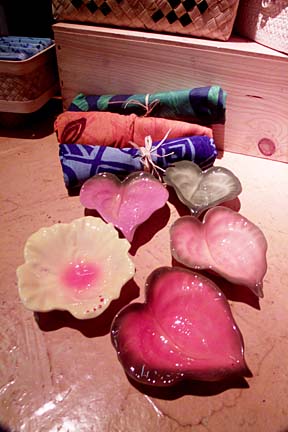


Chinatown AT 10:50 A.M. Friday, Michele Henry arrived at her boutique in Chinatown and greeted a thin elderly man with a long gray beard sleeping on her doorstep under an awning.
cultural plan welcome
but retailers unsure
of effects
A group envisions a cultural
mecca with cafes and street acts;
retailers fear homeless and
prostitutes will remainBy Rosemarie Bernardo
Star-Bulletin"Good morning, Mr. You," said Henry, a name she calls the homeless man rather than "Hey, You."
Mr. You spends most of his nights resting on her brick-red stoop at 1026 Nuuanu Ave. Soon after she wheeled a rack of custom aloha shirts and dresses onto the doorstep, Mr. You picked up his backpack he used as a pillow and left.
"This is very much a part of our life here in downtown," she said. "There's a peaceful coexistence."
But if a planning group has its way, such encounters will be a thing of the past.
Officials of Communications-Pacific and the Hawaii Theatre Center hope to reduce the number of homeless in the area by creating a lively cultural district at night. They want to improve the image of Chinatown and transform it into a cultural mecca.
Plans for wine bars, coffee and pastry shops and after-hour stage performances on the streets with cafe-dining along the alleys are some of the concepts members of the Honolulu Culture and Arts Association would like to see become reality.
Since the Hawaii Theatre re-opened in May 1996, performing arts events has drawn about 150,000 people to Bethel Street annually. The Pegge Hopper Gallery, Arts at Mark's Garage and Indigo Restaurant attract residents and new businesses to Nuuanu Avenue.

So far, many of the store owners along Bethel Street and Nuuanu Avenue agree with more culture-oriented businesses, but a few have reservations, fearing the homeless and prostitutes will not go away and may scare people from venturing into the area at night.Lynn Matusow, chairwoman of the Downtown Neighborhood Board, believes with more cultural and business entities, less crime will occur. "To us, the cultural aspect is a real plus," Matusow said.
The renovated theater is attracting people who never set foot in downtown, she added.
Sarah Richards, president of the Hawaii Theatre Center, said illegal activity is a problem in Chinatown. Before the theater was renovated, homeless people would sleep in the lobby, she said.
More cultural businesses will instill a sense of pride in the neighborhood, she said. "I think it will improve the physical appearance and the safety of the neighborhood."
The Honolulu Culture and Arts Association, comprised of business owners, artists and city officials, was formed in February to assist with improvements to attract customers and new businesses to the district.
To date, the association has received $152,000 in grants and donations from the Cooke Foundation, Empower Oahu Community Investment Fund and C.S. Wo and Co.
"We're very excited," said Christina Kemmer, senior vice president for civic affairs and community building for Communications Pacific. "We're moving forward."
The cultural district can "start to define the soul of the city," she added.
Dana Forsberg, manager of the Pegge Hopper Gallery at 1164 Nuuanu Ave., said, "It would be good to have some wine bars, galleries and coffee shops.
"You can't go out for coffee here. ... We need more places to come to in the evening where people can go to, not just Indigo's," she said.
Rita Luke and Robyn Ader, co-owners of Island Keepsakes on 1050 Nuuanu St., said they're excited to have more cafes where people could mingle with a glass of wine or a cup of latte.
"You still have a few bad apples," said Ader. But "they stay within themselves."
Luke and Ader said they remember when Hotel Street was widely known as the red light district with bar lounges such as Club Hubba Hubba as its main attraction.
"Chinatown has changed a lot," said Ader. "It's not like that anymore."
Retailer Colleen Chun, who sells fine and antique jewelry at 1024 Nuuanu Ave., agrees with the concept of a cultural district.
"People's idea of entertainment is different," Chun said. "They're sort of tired of predictable malls."
However, she's not interested in extending store hours to parallel evening cultural activities.
"It's not for me. I don't wanna be down there when the crazies are coming out."
Police officer S. Lee of the Downtown-Chinatown Substation said more businesses and activities will solve the problem only temporarily. "They just come back out."
Despite the association's plans, Chun believes it will not shoo away homeless people, drug dealers and prostitutes.
"This is their turf," Chun said. "They were here first. They're not gonna go anywhere."